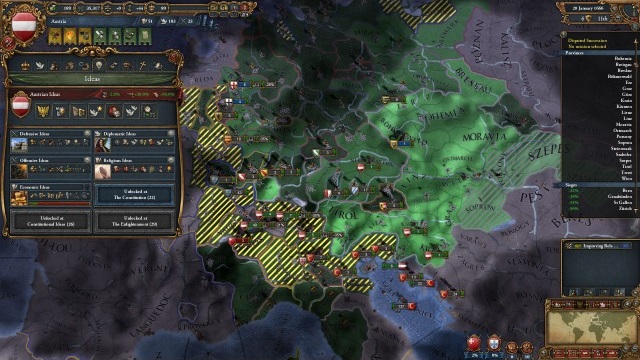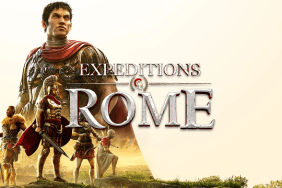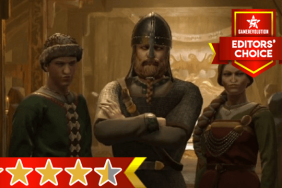Hardcorus Universalis.
Europa Universalis IV, similar to the real world it simulates, does not take kindly to the inexperienced. This isn't anything new for worldly 4X strategy titles, a niche genre known for complex systems that are intricately weaved together. It's common to feel like you're thrown into the deep end, but given enough time to figure everything out on your own, Europa Universalis IV reveals itself to be a solid strategy title that respects the events of history and challenges you to rewrite it.
The first thing you need to understand is that there are no goals, per se, though there are missions and national decisions to guide your actions if you so choose. You simply pick a starting date as early as 1444, choose a country as prestigious as France or as obscure as Mewat, and then start the flow of time while devising the country's future. You can conquer neighboring countries by fabricating a Casus Belli claim on their territory to attack them without destabilizing your country, colonize The New World with eager settlers, become a powerful trade empire with an intimidating navy that can protect precious sea routes, or attempt to survive through diplomacy by forging allegiances and royal marriages with even your toughest rivals. Veterans will also be thankful for the new Production Interface, which allows you to create regiments and buildings without having to click on every territory you own.
Of course, since this is called Europa Universalis and not Eartha Universalis, leading one of the superpowers like France, Spain, or Great Britain affords you the most freedom and power to do as you please. Their high accumulation rate of Monarch Points, which are separated into Administrative, Diplomatic, and Military categories, ensures that your country improves its technology quickly over time and obtains new ideas, essentially perks that award bonus effects, with elevated frequency. Then if they are a part of the Holy Roman Empire, they can vote for particular cardinals in the Papal State and hopefully gain enough control of the religion to enact reformations to their benefit.
If that weren't enough, these juggernauts usually have enough saved in their treasury to create buildings in their territories and influence trade routes significantly by sending merchants to trade nodes and reinforcing them with various light ships. Hiring advisors, forming regiments, and maintaining harbors are merely common chores. Sure, Europe is entrenched in petty squabbles and diplomatic turmoil, but they've got the strength to weather through the rumblings of time without much trouble.
Contrast this to the Iroquois, whom I chose out of curiosity, pity, and nostalgia for my middle-school history class and because I wanted to see if I could alter the course of history by having them not be eradicated from New England. Since Europa Universalis IV pushes time toward historical accuracy, it doesn't make this challenge a walk in the park. But I'm a rebel.
First off, all Native American tribes are slammed with a New World penalty, making all technology advances cost more than twice it does for Western nations, on top of already not starting with any technology and getting a chance of an incapable leader due to having a Tribal government. After conquering the Huron tribe, there might be no neighbors for a century, so diplomatic and economic actions are extremely limited. Your only hope is to reform the government to a Noble Republic, which means taking a disastrous hit on stability, and to wait for a Western nation to settle near you so that you have the option to Westernize, which also means taking a disastrous hit on stability. Then expect riots for decades, low prestige, and Monarch Points to be spent on stability rather than technology improvements.
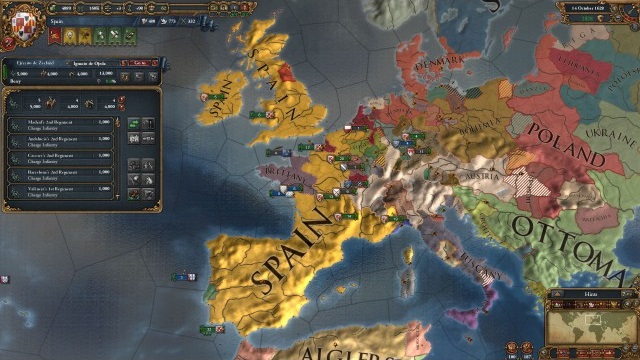
My first attempt, centered around exploring and colonizing the area around me and allying myself with other Native American tribes, didn't fare so well. I overextended my treasury and managed to piss off all the European settlers enough to become hostile. So in my second attempt, I focused on government reform and Westernization first, and assuaged my European neighbors (I'm looking at you, France!) by becoming Catholic, improving diplomatic relations with them, and entering royal marriages where they would be deterred from attacking me. So to survive the Western nations, the Iroquois needed to become a Western nation itself.
Some might view that as a loss, but for the sake of survival, it's a victory. Besides, I believe Europa Universalis isn't so much about winning as it is about experiencing how it feels to be a certain country throughout time. I felt the struggle of the Iroquois to defend its land, its desperation to adopt Western principles by sacrificing its core shamanistic beliefs.
The inherent imbalance between the strength of different nations is an expression of the game's best asset: its history lessons. In the process of attempting to change or follow history, alter the outcome of the War of the Roses, Eighty Years War, or American War of Independence, you experience in broad strokes how certain nations felt during that time. History buffs will appreciate the various "mapmodes" and will certainly debate the details of how accurate Europa Universalis IV simulates the events that led to the famous conflicts throughout the Western world, but the game at the very least is more than capable of initiating this debate and sustaining it.
Multiplayer mode, though, is an entirely different beast. Human players, unlike AI, have no qualms fabricating claims on their rival's territory and conquering it. The best players will have multiple chat windows open, forming makeshift alliances in private, placing trade embargoes and blockades on enemies, and backstabbing others at the most opportune moment. More than one player can control a nation as well, creating an interesting team dynamic and demanding communication. However, it's a bit too easy to form a Casus Belli against another player, but what is multiplayer strategy titles without some havoc?
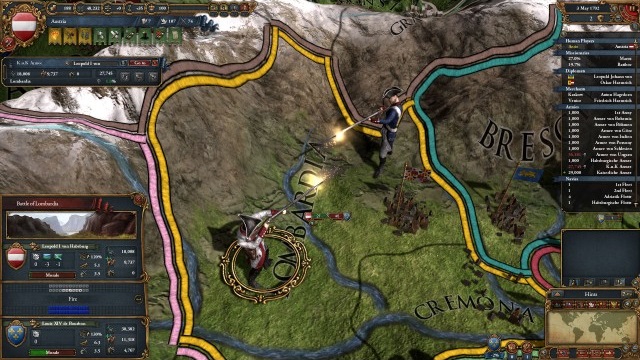
That said, the title could have done more to teach new players on the various aspects of the game as they occur. Several breezy tutorials and the new hint system help somewhat, but some advisors like the ones in Civilization who give advice on the fly, as well as an encyclopedic catalog of key concepts and words, would benefit greatly. It's easy to be drowned in stats and numbers without knowing whether they really matter or not. For instance, it's never clear how sending a merchant to a particular trade node will affect your trade power without having to dissect pie charts. More audio cues for when projects complete and a wider selection of music would also be nice touches.
Europa Universalis IV is a worthy timesink if you're the type who enjoys being embroiled in global politics and the grandeur of history, and want a distraction from Paradox's other successful title Crusader Kings II. It's definitely an improvement in the accessibility and scope of prior Europa Universalis installments, though it still has room to grow on that front. But as an investment of time, Europa Univeralis IV gives more than what you put in, and that's exactly what armchair generals want.
-
In-depth history lesson
-
Production Interface
-
Complex systems
-
Strong multiplayer
-
Could do better relaying important information
-
Interface lacks a little polish
